Fall 2024
September 5, 2024Fall 2024
September 5, 2024Newsletters
Winter 2025
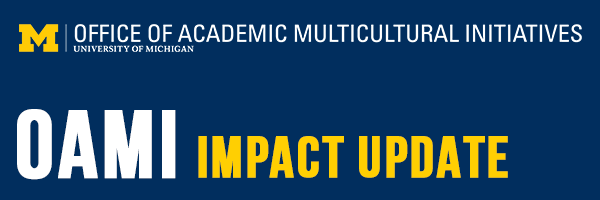
Welcome to the Winter 2025 edition of the OAMI Impact Update. As we approach the end of another academic year, one that has brought a multitude of challenges, we also take every opportunity to acknowledge that the journey is strengthened by the support of so many who value the work and impact of OAMI. With everything happening on our campus and in the world, it's been a lot to navigate and absorb. However, OAMI continues to provide opportunities that support students and enrich the campus community. We are excited to share with you some of the important work we've been doing.
We were honored to host the 39th annual MLK Symposium Keynote Lecture while supporting student projects connected to Black History Month. In our work, we always keep in mind that OAMI exists because of Black student activists and other allies’ commitment and sacrifice to building a more equitable university. We are excited to share an initiative that documents this work, the Black Action Movement Legacy Tour, which you can read more about below.
Thank you for your ongoing support during these unprecedented times. OAMI is committed to uplifting all students through academic excellence and multicultural engagement. As we move forward, we are grateful for the network of individuals, organizations, and community partners that serve to inspire, confirm, and support this work.
If you are interested in sharing how OAMI made a difference for you, please contact [email protected]

The Rev. Dr. Martin Luther King, Jr Symposium and the power of restless dissatisfaction
This year’s 39th annual MLK Symposium theme, “Restless Dissatisfaction: An Urgent Call for the Pursuit of Justice and Equality,” continued exploring the ever-evolving philosophy of Dr. King. His idea of restless dissatisfaction is not simply about unhappiness and anger, but about rejecting complacency and confronting injustice in deeply challenging times.
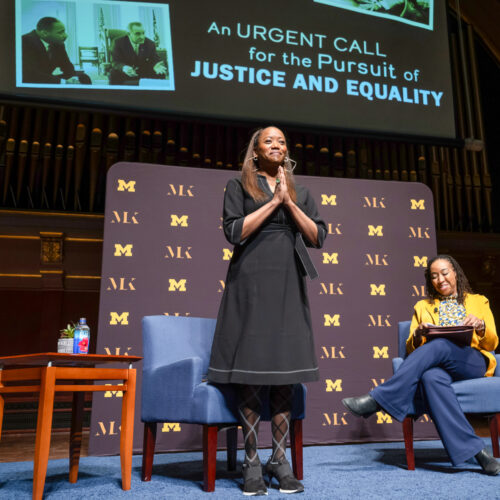
Actress, activist, and producer, Erika Alexander spoke with Michigan's Dr. Daphne Watkins during the 2025 MLK Symposium Keynote Lecture
With our organizing committee made up of faculty and staff from across campus and the greater community, we developed an inspiring and captivating keynote lecture featuring Erika Alexander, actress, trailblazing activist, entrepreneur, creator, producer, and director. While the committee developed the focal point and framework of the symposium, its true power lies in a month-long calendar of over thirty celebrations, talks, performances, and other events made possible by collaboration and engagement from groups across campus and southwest Michigan.
At Hill Auditorium on Monday, January 20, Erika Alexander shared her experience growing up in a family of itinerant preachers and the steps she had taken to forge ahead into a deeply impactful career. Dr. Daphne C. Watkins, a University Diversity and Social Transformation Professor, and the Letha A. Chadiha Collegiate Professor of Social Work and professor of social work at Michigan, framed the conversation around the theme of restless dissatisfaction, which Alexander challenged the audience to channel as they fight for justice.
The keynote brought over 1,300 people to Hill to celebrate King’s legacy, and over 4,300 live streamers joined from across the country, including Louisville, Atlanta, DC, and Florida. Our continuing partnership with Detroit PBS garnered over 3,000 views via their Facebook page, with one user remarking, “Thank you so very much for streaming this today. This is content for me today. This is what I am celebrating."
In addition to the keynote, Alexander joined a group of more than 75 student leaders at the Trotter Multicultural Center for an intimate conversation about student activism and learning to follow your own path. She listened deeply to students looking for advice on how to find their passion and use their art for justice while making time for family and self-care. She pressed everyone in the room to do their homework to understand the movements that had come before them and to use this work as a template to inform their community engagement. Alexander spent the remainder of her time with the students, offering selfies, hugs, and words of encouragement.
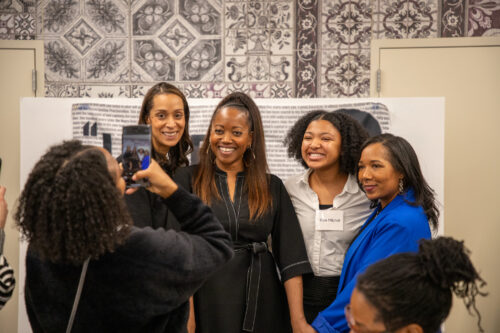
Students, faculty, and staff had a chance to connect with Erika Alexander during an intimate lunch and discussion after the keynote
Next year marks the 40th anniversary of the symposium, and we are excited to bring the community a program of events that honor this significant milestone. Like OAMI, the MLK Symposium and accompanying university celebrations came about through student protests and demands. We look forward to you joining us in 2026 to celebrate 40 years of the symposium!
You can read the full MLK Symposium theme statement and more at mlk.umich.edu

First-Generation Initiatives build on student engagement to lead across campus
Master’s candidate Lexie Milukhin is excited about the work she does to continue a growing movement. She says, “Being First-Gen at Michigan is stepping into a legacy that I am proud to be a part of. The physical space, the programs, even the position I'm in are the direct result of decades of first-generation student activism.”
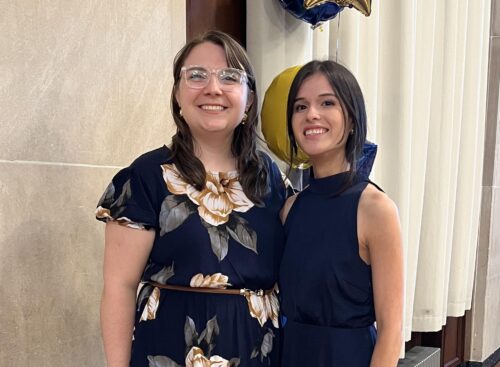
Lexie Milukhin (right) and Dr. Terra Molegraff, Director of First-Generation Initiatives, at the annual First-Generation Student Celebration
Lexie works alongside Terra Molengraff, PhD, OAMI’s Program Director of First-Generation Initiatives, to serve one of the fastest-growing student communities on Ann Arbor’s campus. Currently, 15% of all undergrads, 18% of first-year students, and 17% of new transfer students fall within this group.
There has been similar growth among many higher education institutions, leading to an increasing recognition of first-gen students' unique contributions. Dr. Molengraff and other researchers have identified specific ways first-gen students enrich the campus community. This includes their ability to navigate and find new and innovative ways of problem-solving, a strong commitment to the community and giving back, and tenacity and perseverance when facing complex challenges. Many campuses have created specific First-Generation student spaces, like OAMI’s First-Gen Student Gateway, which opened in 2017, to bring students together and connect them to resources across campus.
"In my time working with Terra, our program director, I've had the invaluable opportunity to reflect on my own experiences, develop cross-campus partnerships, and collaborate with other First-Gens to design and support programs that make a difference, including a mentorship meet, annual community dinners, and professional development events!"
- Lexie Milukhin, First-Generation Initiatives student staff
Schools, colleges, and student support offices at U-M have also taken notice. The Ross School of Business, College of Engineering, Kessler Scholars Program, the College of Literature, Science and the Arts, and the School of Music, Theater, and Dance all have either a full-time staff member or an individual with a specific focus on supporting first-gen students. The foundation that OAMI has helped build over the past decade has created an organizational framework for effective collaborations and cross-campus initiatives.
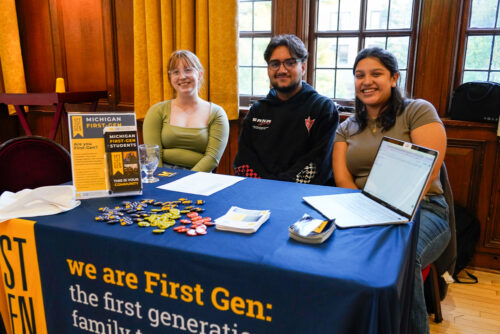
While OAMI helps guide the broader campus vision for First-Gen initiatives, students drive the peer engagement that makes the community thrive. At tabling events, members of the First-Gen student org make themselves available to answer any questions about resources and opportunities.
Furthering this leadership, Dr. Molengraff is facilitating the inaugural “First-Generation Coordinating Council” for the 2024-25 school year. The council aims to bring all the leaders of first-gen programs across campus together to form a vision to excel in supporting students across the institution. Already, the council has identified shared values implemented through every first-generation student program at U-M and strategized around staff and faculty engagement.
Ultimately, first-gen support comes down to helping individuals build relationships and feel at home at Michigan. The First-Generation Initiative now hosts six signature events where students can learn about resources, receive guidance from peers and professionals, and feel connection and camaraderie. Within this space, they build the confidence to realize their ambitions. As one undergrad said, “Being a first-generation student can be hard because you are establishing your own path, but that is liberating in its own way.”
Learn more about OAMI's First-Generation Initiatives and the students that further its mission at firstgen.umich.edu

The BAM Legacy Tour brings untold stories of activism to today's students
Several projects and initiatives are working to uncover how underrepresented students have shaped the university. OAMI is proud to contribute to such work with the Black Action Movement Legacy Tour. The series of short documentaries and collection of resources is aimed at educating students about how the demands of their predecessors led to the offices and resources that improve their experience on campus.
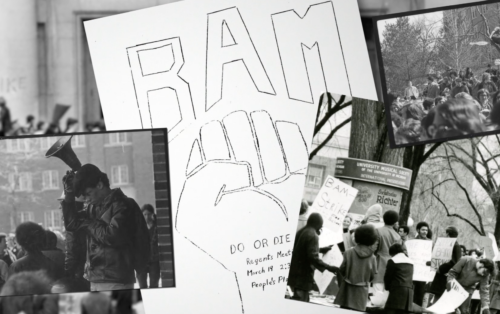
A still from Part One of the BAM Legacy Tour videos covering the first BAM protests in 1970
For decades at U-M, students used collective action to pressure the administration and fight for a more equitable campus. Using sit-ins, rallies, and mediated negotiations, students condemned racist acts, rallied to increase Black enrollment, and petitioned for safe spaces on campus for students of color. These videos go in-depth into the actions of generations of young people as they fight to be fully recognized on campus.
A joint project of OAMI, the Office of Multi-Ethnic Student Affairs (MESA), and the Trotter Multicultural Center, the Legacy Tour videos debuted at last year’s Juneteenth Symposium and continue to be used at student events and workshops. After watching the videos, one student remarked, “I didn't know about some of the history of protest behind the facilities we have today. I learned about how recently we actually achieved these things and how many obstacles activists had to overcome.”
We welcome you to explore the BAM Legacy Tour and learn more about these critical moments in the university’s history.

With skills developed at OAMI, an alum empowers students of all ages in his community
Since graduating from the University of Michigan last spring, Alexis Jimenez has been strengthening connections in his hometown of Grand Rapids, Michigan. As the workforce development coordinator at the Hispanic Center of Western Michigan, he oversees the Youth Employment Initiative, which provides internships for 14 to 24-year-olds, and coordinates Spanish GED classes for adults.
Empowering both youth and older clients is deeply personal for Alexis. Reflecting on the internship program, he says, “I see a lot of myself in the students I work with. Seeing them navigate their education and careers, usually self-guided, is something that resonates with me.”
For the adult learners, many of whom delayed education due to lack of resources or pressing family needs, Alexis is proud to witness them prioritizing their education. He notes that since selflessness is honored so much in the community, “it’s good seeing such people put themselves and their own education first.”
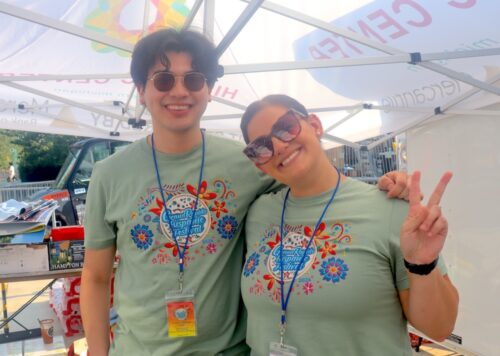
Alexis Jimenez (left), with his colleague from the Hispanic Center of Western Michigan, working at the Grand Rapids Hispanic Festival
Alexis finds a direct line between his undergraduate experiences and his current work. At OAMI, he developed strong navigation skills through the Success Connects program. He now finds them useful in forging partnerships and meeting client needs. He emphasizes the importance of meaningful connections, saying, “Making those connections is easier when it's paired with authenticity. I think OAMI led a good example of networking not just out of self-interest, but from a genuine desire to build professional relationships.”
As Alexis advanced in his studies, he found that OAMI’s support grew with him. After participating in SuccessConnects, he became an Academic Success Partner in the program, where he mentored sophomores interested in pursuing a business-related career. He earned a Student Academic Multicultural Initiatives (SAMI) grant, offsetting some of the costs of joining a trip to Washington, DC, for a business and public policy class.
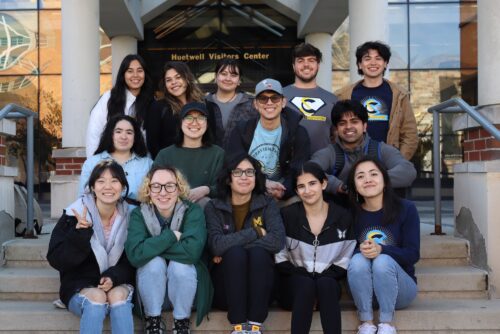
Alexis (top right) began college as a SuccessConnects mentee, eventually becoming a SuccessConnects mentor himself. Here, he's pictured with fellow Academic Success Peers and the OAMI Program Coordinator, Julia Barron (bottom row, middle)
In the spring of 2023, Alexis graduated with a Bachelor of Business Administration from the Stephen M. Ross School of Business and a Bachelor of Arts in Film, Television, & Media from the College of Literature, Science, and the Arts. Alexis noted, “By the end of my time on campus, I finished Michigan by participating in two of OAMI's student celebrations, letting OAMI be one of the first offices I began undergrad with and the last office to send me off.”
As a first-generation graduate, Alexis takes great pride in his accomplishments while recognizing the complexity of identity in the US. Even if such ideas may weigh heavy on him at times, they propel him forward. Employing the skills honed at OAMI, Alexis dedicates himself to uplifting his community while never forgetting the transformative impact of a university diploma: “With the kind of work I do now, the economic empowerment higher education has given me is something I don't take for granted.”

